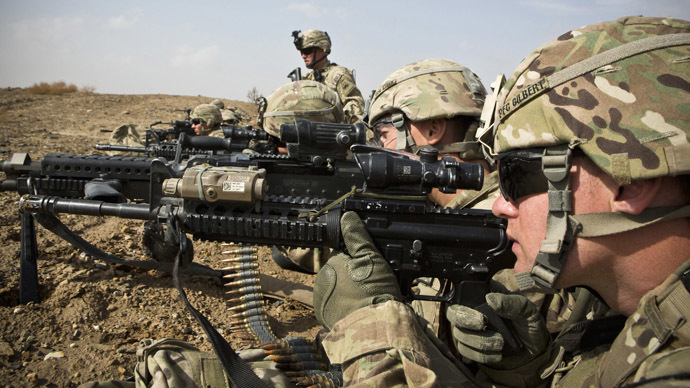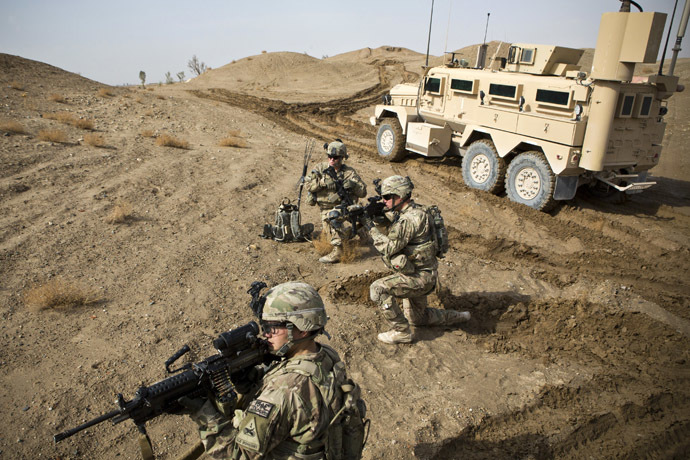RT
April 19, 2014

Every year the Stockholm International Peace Research Institute (SIPRI) releases a study on military spending around the world. This year’s report contains many interesting details.
Some things in the report presented by the United Nations Commission on disarmament on April 14 have not changed at all. As has been the case for decades, the United States remains the largest military spender in the world, despite the much heralded “defense cuts.” The US, NATO, and “non-NATO US allies” account for over 64 percent of all military spending in the world.
Preparations for war in the Middle East?
The report, however, pointed out that US aligned regimes in the Middle East are rapidly increasing their military spending, and purchasing modern, high-tech weapons. The list of US aligned states in the Middle East is a collection of autocratic, repressive kingdoms and emirates. These countries are not “democratic” by any stretch. Saudi Arabia, Qatar, Oman, Bahrain, and other states are absolute monarchies. People are flogged, stoned, and beheaded routinely. Torture goes on without apology, and no elections take place. “Free speech” is nearly non-existent, as people are locked up, arbitrarily killed, and otherwise repressed for speaking out.
Those who consume US TV and print media are constantly bombarded with “journalism” demonizing the Islamic Republic of Iran, and the Syrian Arab Republic, while the crimes of this lengthy list of US backed Middle Eastern states, which make not even the slightest pretense of being democratic, are ignored. The US props up these autocratic states with billions of dollars in foreign aid, and Wall Street oil corporations make trillions in profits through control of their natural resources. When the population of these states has risen up and demanded democratic and economic rights, these regimes use their stockpiles of US made weapons to gun down protesters, burn entire neighborhoods, and enforce their rule with terror and violence. The violent response to recent uprisings in Bahrain, the jailing of poets in Qatar, and the continued US coddling of their monarchs shows the complete hypocrisy of any “human rights” rhetoric from Washington D.C.
However, in the last year these US puppet regimes in the Middle East have increasingly embraced the business of war. The Kingdom of Saudi Arabia is now the fourth largest military spender in the entire world. It is stockpiling modern missiles, tanks, and other high tech mechanisms of destruction and death. Oman, Qatar, and the United Arab Emirates are also increasing their military build-up. These regimes are currently funding, training, and arming the insurgent groups in Syria, where over 100,000 people have already died in what was once a peaceful country. The millions of refugees in Syria are desperately fleeing to other parts of the region, as “rebels” burn their homes, kidnap their children, and carry out public beheadings. Money and weapons flowing from US-backed autocratic regimes is keeping the four-year civil war going, with more people dying each day.
The rise in military spending in the Middle East points toward plans for a wider war. The turmoil in Tunisia and Egypt in 2011 that resulted in the removal of US puppet Hosni Mubarak, and the failure to overthrow the Syrian Arab Republic after years of civil war, point toward a real weakness in US influence in the Middle East. When Obama announced he intended to rain cruise missiles on Syria, he was forced to back down. As the US aligned autocratic states in the gulf build up their military power, it looks as if some kind of desperate drive to regain lost influence may be in the works.
Surrounding China and North Korea
The much discussed “Asian Pivot”, where the US is increasing its military activity in the Pacific, comes at the very moment that US aligned regimes in Asia are rapidly increasing their military spending.
The government of the Philippines routinely carries out extralegal executions and assassinations. Journalists who print stories critical of the government routinely disappear and later wind up dead. The Philippines, already home to many US military bases, has increased its military spending by 17 percent. Much of the military activity in the Philippines is devoted to suppressing the New People’s Army, a group of communists with a great deal of popular support who have been waging a “People’s War” against the US backed autocratic state.
South Korea (where “National Security Laws” can land you in prison for tweeting, and striking workers are routinely gunned down), is the 8th largest arms importer in the world. The country is also home to US military bases, and it is stockpiling missiles, military aircraft, and other modern weapons.

Azerbaijan, a US aligned regime in Central Asia, is known for its violations of human rights. Amnesty International declares that human rights in Azerbaijan are in “steady decline.” Over the course of the last ten years, Azerbaijan has increased its military spending by 378 percent.
Australia, the US aligned European settler state has increased its import of arms by 83 percent.
The People’s Republic of China and the Democratic People’s Republic of Korea, two Asian societies that have defied Wall Street and openly speak against international capitalism and imperialism are being surrounded by US and US aligned military forces. China’s increasing economic influence around the world, especially in Latin America and Africa is a threat to Wall Street’s economic power, and moves are being made to surround and suppress it. In response to a rising, hostile military presence on its borders, China has increased its military spending as well.
The Democratic People’s Republic of Korea, despite remaining surrounded and under hostile sanctions, has actually re-adjusted its domestic budget. The “songun” policy of military first is being altered, and more money is being spent domestically on programs such as the new boom of housing construction. The successful test of nuclear weapons seems to have supplied the country with a new level of security, allowing it to cut back on its military spending.
The DPRK has a record of aligning with governments that defy Wall Street around the world, such as Zimbabwe. The DPRK has provided military aid to many countries fighting for independence from Wall Street domination over the course the last few decades. Kim Il Sung even famously welcomed a delegation from the Black Panther Party in 1969, supporting their fight against racism in the United States.
The danger of a new world war
As the world economy remains in crisis, the trends in military spending are disturbing to many. Prior to WW1, exactly one hundred years ago, the US radical leader, Emma Goldman, mocked those who claimed the building up of armaments would prevent war. She declared that Woodrow Wilson’s policy of “preparedness” in purchasing huge amounts of weapons was not a road to peace, but “the road to universal slaughter.” She was proved correct when WW1 erupted across Europe, and millions of people died. Although Wilson had been elected on an anti-war platform, in 1917 the US entered the conflict, and those who dared protest were jailed, killed, and tortured.
In modern times, conflicts seem to be unfolding across the world at a rapid rate. Although these conflicts take place in different regions, they are all just episodes in the same global confrontation. In Venezuela, the popular democratic government, aligned with Russia and China, is fighting a group of violent opposition forces backed by Wall Street. In Syria, the government that has aligned with Palestine and provided healthcare and education, is also being attacked by violent extremists backed by Wall Street and it Gulf State puppets. In Ukraine, violent ultra-nationalists backed by Wall Street seized the government after it refused to join the IMF, and in Donetsk and other parts of the country, the people are fighting against them, hoping for support from Russia and China.
As US aligned states across the globe stockpile weapons, it looks like this trend of violence by Wall Street and its allies is not going away. They may be preparing for a much larger all-out war to keep control of the world, as their economic system grinds to a halt, and the countries seeking independent development continue to prosper.
 Daily Stormer The Most Censored Publication in History
Daily Stormer The Most Censored Publication in History


